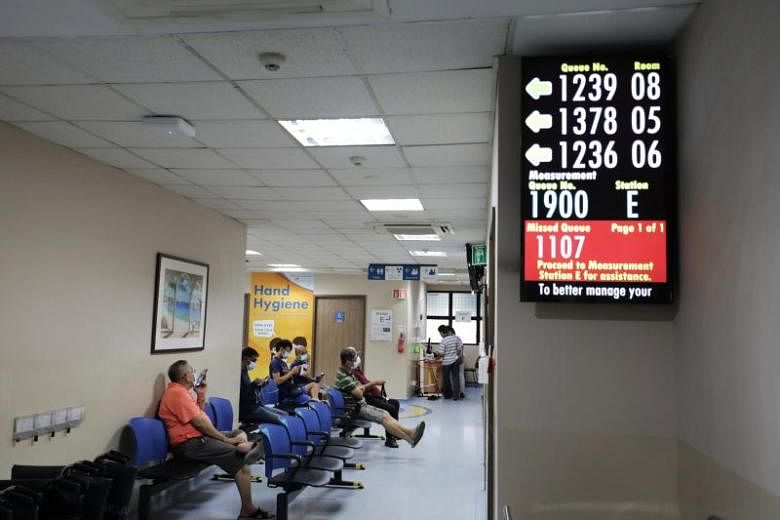SINGAPORE - There has been a dramatic drop in the number of people seeing doctors in the past two months for infectious diseases usually transmitted from person to person, with some doctors saying good hygiene and social distancing measures are major factors contributing to the slide.
The biggest fall is in acute upper respiratory infections, which include both influenza and the common cold.
While around 2,500 to 3,000 people a day usually see polyclinic doctors for these ailments, the number had dropped to less than 700 by the start of May, according to Ministry of Health (MOH) figures.
Data collected from the 20 polyclinics here are used for sentinel surveillance to identify trends.
What the data showed were similar drops in patient numbers for ailments like diarrhoea, conjunctivitis and hand, foot and mouth disease.
These are diseases spread through human contact, coupled with poor personal hygiene.
The trend was also observed by medical group Parkway Shenton.
Most of the group's clinics have seen up to a 50 per cent drop in patients with respiratory tract infections since the start of the year.
"This is largely due to the government's circuit breaker measures where people are staying at home and wearing masks when going out," said Dr Edwin Chng, the group's medical director.
He added that there are also patients who "do not want to seek medical attention because they are afraid to be given the five-day medical certificate", as it would mean they cannot leave their homes.
But they are few.
MOH had from February advised doctors to give five days of sick leave to patients with respiratory symptoms, such as fever, cough, sore throat and runny nose, in an effort to prevent further community spread of the coronavirus.
Given that most people are working from home, Dr Chng also said that the drop in patients is higher - as much as 80 per cent - in its clinics within the business district.
Dr Wong Sin Yew, an infectious disease expert at Gleneagles Hospital, agreed that social distancing and better personal hygiene are major factors contributing to fewer people getting infected.
This same drop in people infected by the flu or common cold has also been observed in Taiwan, he said.
Circuit breaker measures in Singapore started on April 7, with the majority of people working from home, and sticking to social distancing rules and wearing masks when in public.

In January, since the emergence of Covid-19, people have also been urged to wash their hands frequently, and every household has been given hand sanitisers to use when hands cannot be washed with soap and water.
Ms Joan Pereira, a member of the Government Parliamentary Committee for Health, said: "Things have changed since the arrival of Covid-19 on our shores, including our daily hygiene habits and more recently, safe distancing measures."
The MP for Tanjong Pagar GRC added that good hygiene habits are good practices "and should definitely continue even after Covid-19 is no longer a threat".
She is confident that people are now more aware of the need for hand washing and wearing a mask if going out when unwell, and "most will likely continue" with the practice even after measures are relaxed.
Ms Pereira added: "We should also encourage employers to remind their workers to stay home or work from home if they are feeling unwell, given that more employers are now able to find ways to adapt their work to be done remotely due to this pandemic."
Dr Wong said: "If we continue to wear masks, practise safe distancing and practise good hygiene habits - it will reduce Covid-19, influenza and many other respiratory viral infections."
Dr Chng agreed that masks help to reduce the spread of respiratory infections.
He added: "In addition, it is important for everyone to continue the practice of regular hand washing with soap and water."
While some infectious diseases have fallen, the number of dengue infections - mosquito-borne disease - has bucked the trend.
There are more than 7,000 dengue infections to date this year, which is more than double that for the same period last year.












